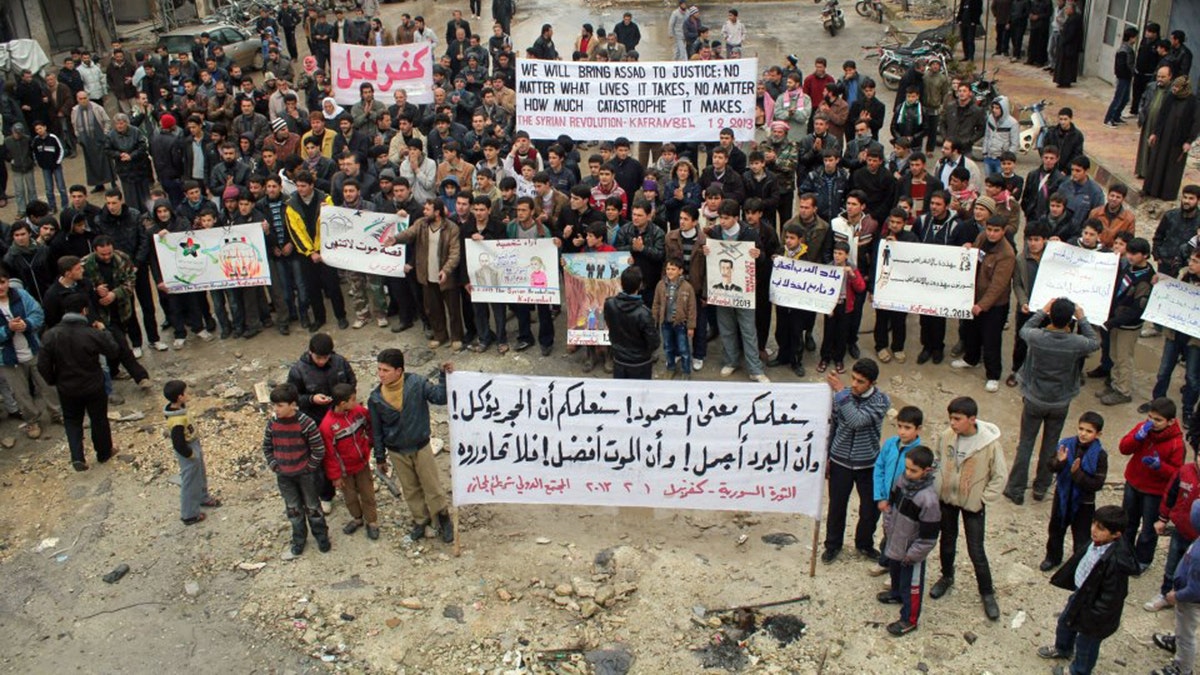
Feb. 1, 2013: This citizen journalism image provided by Edlib News Network, ENN, which has been authenticated based on its contents and other AP reporting, shows anti-Syrian regime protesters carrying banners during a demonstration, at Kafr Nabil town, in Idlib province, northern Syria. (AP)
BEIRUT – Syrian rebels captured a strategic neighborhood near Aleppo's international airport on Saturday, putting opposition fighters in control of a key road that the regime has used to ferry supplies and reinforcements to soldiers fighting in the embattled northern city, activists said.
Elsewhere in the nation, fighting continued unabated, killing more than 60 people nationwide, according to activists.
Troops loyal to President Bashar Assad and rebels have been locked in a deadly stalemate in Aleppo, Syria's largest urban center and main commercial hub, since an opposition assault last summer. Seven months later, the rebels hold large parts of the city and its outskirts, including several army bases, but they have been unable to overcome the regime's far superior firepower.
The capturing of the Sheik Said neighborhood, southeast of Aleppo, is a significant blow to regime forces because the area includes a major road, linking the northern city with the airport. The army has used the road to supply troops.
The Britain-based Syrian Observatory for Human Rights said rebels captured the area Saturday after several days of fierce battles with Assad's troops. Rebels have previously established enclaves outside Syria's major cities to threaten the regime, including near the capital, Damascus, but they were later attacked by Assad's fighter jets and artillery.
In an effort to reverse rebels' advance in Aleppo, regime's war planes carried out several airstrikes on the Sheik Said, the Observatory said. There were no reports of casualties from the bombing.
The opposition's Western backers, including the United States, have been reluctant to supply rebels with more sophisticated weapons because of the increased influence of an Al Qaeda-affiliated group among the anti-Assad fighters on the front lines. The Islamists growing prominence in the Syrian opposition has fueled fears that Muslim radicals might try to hijack the revolt that started as peaceful protests against Assad, whose family has ruled Syria for more than 40 years.
In Germany, Vice President Joe Biden said, "The opposition (to Assad) continues to grow stronger."
Speaking at an annual security conference in Munich, Biden stated the conviction of the U.S. and many others. "President Assad -- a tyrant hell-bent on clinging to power -- is no longer fit to lead the Syrian people and he must go," Biden said.
Assad has repeated brushed aside international calls to step down, characterizing its opponents as Islamic extremists who are out to destroy the country. In a speech last month, Assad outlined a peace initiative that would keep him in power.
The opposition coalition has rejected any talks with Damascus until Assad steps down. However, Moaz al-Khatib, the president of the coalition that is dominated by the Muslim Brotherhood movement, said Wednesday that he is willing to negotiate with members of Assad's regime to bring a peaceful end to the country's civil war.
Later on Saturday, Biden was scheduled to hold a separate meeting in Munich with al-Khatib as well as the international envoy to Syria's conflict, Lakhdar Brahimi, and Russia's foreign minister, Sergey Lavrov.
Russia is Assad's longtime ally, and it has disagreed sharply with Washington and its Western allies on ways to end the bloodshed in Syria. Moscow has maintained that Assad is part of the solution to the crisis, though Russian officials have recently criticized their ally in Damascus and even mentioned the possibility of rebels winning the war.
However, Lavrov told the gathering of top security officials that Biden's statement that Assad must go was counterproductive.
"The persistence of those who say that priority No. 1 is the removal of President Assad -- I think it's the single biggest reason for the continued tragedy in Syria," Lavrov said.
Syria's civil war is estimated to have claimed more than 60,000 lives since the uprising against Assad erupted in March 2011.
Despite disagreements on ways to end the fighting and Assad's role in peace efforts, Lavrov said Russia shared the West's concern over the fate of Syria's arsenal of chemical weapons.
As the regime grows more desperate to retain power, many fear it could use the weapons against its own people -- a claim Damascus has repeatedly denied. There have also been concerns that conventional and unconventional weapons that Syria is said to have could end up in the hands of Islamic radicals.
"The red line is a common line for all of us: We are categorically against any use of weapons of mass destruction, be it chemical, be it biological, be it nuclear," Lavrov said. He added that the Syrian government has repeatedly assured Moscow that it is watching over those weapons and keeping the rebels away from the sensitive sites.
"Our partners agree with us that the biggest threat is the probability or possibility that the rebels get hold of those chemical weapons," Lavrov said.
In the north, regime war planes hit rebel-held areas in Idlib province as troops fought rebels in Deir el-Zour in the east, an oil-rich area along Syria's border with Iraq, the Observatory said. Fighting also raged in the central provinces of Homs and Hama, in the restive suburbs of Damascus that were also hit by air strikes and in the southern province of Daraa, the birthplace of the uprising.
State-run SANA news agency said 15 people were killed and 22 others were wounded when a car, packed with explosives detonated prematurely in Idlib's Saraqeb city. The report said all the dead and wounded were "terrorists," a term the government uses for rebels.
